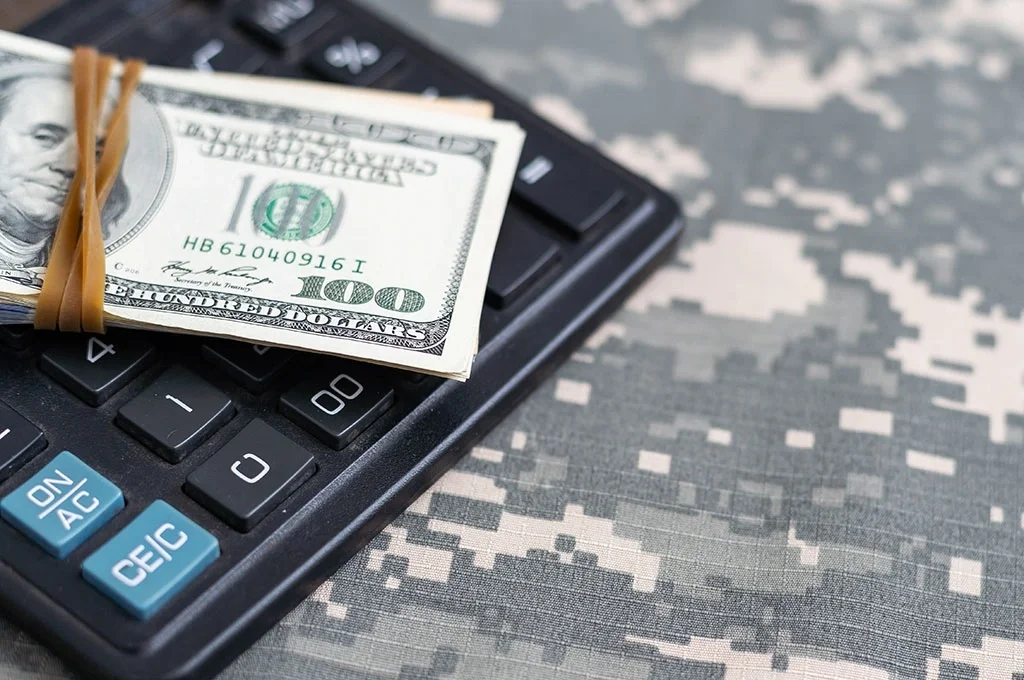
Saving Money After Military Service
You served your country. You followed orders. You completed missions. Now you're drowning in civilian financial chaos, watching your money evaporate before you can save a dime. Here's the brutal truth: the military trained you for combat, not compound interest. You went from a system that handled your savings automatically through TSP deductions to a world where every financial decision is yours to screw up. And most veterans do exactly that.
The Military Never Taught You to Save—And That's Killing Your Future
The numbers don't lie. Over 60% of post-9/11 veterans report difficulty adjusting to civilian life, compared to just 25% of veterans from earlier eras. This isn't about weakness or failure. It's about systematic unpreparedness for a financial system designed to extract wealth, not create it.
In the military, housing wasn't a decision, it was a given. You didn't have to haggle with landlords or worry about utility bills. Now you're juggling rent, utilities, insurance, and a dozen other expenses that used to be invisible. The average civilian spends 30% of their income on housing—though financial experts used to recommend 25%. Veterans never had to think about that percentage before.
Military pay was automatic and predictable. Retirement contributions happened without your input through systems like the Thrift Savings Plan. Healthcare was comprehensive and free at the point of service. The military made your savings decisions for you through what I call an "artificial environment of scarcity"—you couldn't overspend because your options were limited.
Now? Every dollar saved is a conscious choice you have to make while fighting the urge to spend on everything civilian life throws at you. The typical civilian manages 15-20 different monthly bills and subscriptions. You went from maybe 3-5 financial obligations to suddenly tracking and budgeting for everything.
The transition period devastates savings potential. According to CFPB data, defaults and serious delinquencies are between two and ten times more likely to appear on credit records in the six months after separation. When you're drowning in debt at 20-25% interest rates, savings becomes a fantasy.
Savings Is Freedom—And You're Giving Yours Away
Stop thinking of savings as deprivation. That's poverty thinking. Savings is power—raw, undiluted financial power that changes everything about how you move through the world.
Without savings, you're a financial hostage. Every unexpected expense becomes a crisis. Every job becomes a prison you can't afford to leave. You become reactive instead of strategic, desperate instead of deliberate. The data shows that most people want something better—they know what's required—but they don't have the discipline to execute.
Here's the secret wealthy people understand: They became millionaires by budgeting and controlling expenses, and they maintain their affluent status the same way. For every 100 millionaires who don't budget, there are about 120 who do. The ones who don't? They create an artificial economic environment of scarcity for themselves—they invest first and spend the balance.
Savings creates options that compound into freedom. With six months of expenses saved, you can walk away from toxic situations. You can weather emergencies without debt. You can seize opportunities that require capital. As one financial independence practitioner discovered, having that pile of cash means you can leave jobs that aren't right, rest, soul search, and end up in situations you never could have dreamed up.
Stop the Bleeding Before You Start Building
You can't save from a deficit. That's mathematics, not motivation. Before you can build wealth, you have to stop bleeding money. This means getting ahead of the paycheck-to-paycheck death spiral that traps most Americans.
Debt Must Die First
Nearly 15 percent of bankruptcy filers are veterans—more than double their representation in the adult population. You can't save while servicing debt at 20% interest. Every dollar paying interest is a dollar that could be earning interest through compounding—what Einstein allegedly called the eighth wonder of the world.
Attack debt with military precision. The only exception is a small emergency fund—$1,000 to $2,500—to prevent new debt accumulation during the payback period. This isn't savings; it's debt prevention. Use the debt avalanche (highest rates first) or debt snowball (smallest balances first) method. Both work if executed relentlessly.
The Pay Yourself First Revolution
Before any bill, before any expense, before any want—pay yourself. This isn't new advice; it's how generations before us successfully budgeted. They got paid, funded their savings first, set aside money for bills, then spent the rest. Simple. Effective. Proven.
The modern version uses automation. Set up automatic transfers from checking to savings the day after payday. Start with 10% of gross pay—that's the baseline the research shows works. Can't do 10%? Start with $5 to prove the system works, then increase gradually. The First Step Cash Management System shows that even high earners need this structure to avoid lifestyle creep.
Your Budget Is Your Battle Plan
Traditional budgeting fails because it's backward-looking, shame-based tracking. The better approach is forward-looking allocation. Give every dollar a job before it arrives. Housing? Assigned. Food? Assigned. Debt? Assigned. Savings? Assigned. This isn't restriction; it's resource allocation.
The 60% Solution suggests your basic expenses (food, bills, taxes) should be 60% of gross income, with the remaining 40% split between retirement (10%), long-term savings (10%), short-term savings (10%), and fun money (10%). Adjust these percentages to your situation, but have a plan.
The Savings Hierarchy That Actually Works
Not all savings are equal. Strategic prioritization determines whether you build wealth or just accumulate cash that gets raided for the next crisis.
Your Financial Foxhole: The Emergency Fund
This is your first and most critical savings goal. Park three to six months of expenses in a high-yield savings account at a different bank than your primary checking. The separation reduces temptation. Online banks offer rates significantly higher than traditional banks while maintaining FDIC protection.
The emergency fund isn't for new tires or Christmas presents—those are predictable expenses you should budget for. True emergencies are job loss, medical crises, family disasters. If you're asking whether it qualifies, it doesn't. This fund is your "walk away" money—the power to leave bad situations without destroying yourself financially.
The Long War: Retirement
Starting retirement contributions early gives you the most valuable asset: time. A 25-year-old who starts saving has four decades for their money to grow before traditional retirement. Every year you delay means you'll need to save significantly more each month to reach the same goal. The earlier you start, the less painful it is.
If your employer offers 401(k) matching, that's an instant 50-100% return. Max the match before any other non-emergency saving. Beyond that, target 15-20% of gross for retirement. The Roth IRA is particularly powerful for younger veterans—pay taxes now at lower rates, withdraw tax-free later. Target-date funds automate everything, adjusting risk as you age. They're not lazy; they're smart.
Building Your FI Number
Financial independence equals 25 times your annual expenses. Spend $40,000 yearly? You need $1 million invested. This isn't about getting rich; it's about having enough that work becomes optional. The 4% rule suggests you can withdraw 4% annually from your investments indefinitely. Being financially independent is as much about controlling needs as building assets.
Strategic Acquisition Fund
Create separate labeled savings accounts for major purchases: "Next Car," "House Down Payment," "Vacation." Specific goals motivate better than general savings. Watching balances grow toward concrete goals maintains momentum. This prevents financing purchases that depreciate instantly while costing multiples in interest.
Mission Planning for Your Money
Vague goals produce vague results. "Save more money" is a wish. "Save $500 monthly for emergency fund until reaching $10,000 by December" is a mission. Your goals need five elements: specific amount, deadline, purpose, priority, and measurement method.
The research from successful savers shows clear patterns. They operate on annual budgets, know exactly what they spend on food, clothing, and shelter, and have written goals with tracking systems. They treat budgeting like mission planning—because that's what it is.
Start with one goal. Master it before adding complexity. Track progress obsessively—weekly balance checks, monthly reviews, quarterly adjustments. Millionaires spend more time planning their finances than exercising. That's the difference between wishing and achieving.
Tactical Execution: Making Savings Happen
The Automation Advantage
The best savings plan runs without you. Here's the optimal flow, assuming you're paid on the 1st of the month:
-
2nd: 401(k) deduction and remaining pay hits checking
-
5th: Automatic transfers to savings (emergency fund, goals)
-
5th: Automatic transfer to Roth IRA
-
7th: Bills auto-pay from checking or credit cards
-
Remaining: Guilt-free spending money
This system treats your checking account like an email inbox—everything flows through, then gets filtered to the right place. Leave a $500 buffer initially for safety.
The Envelope System for Spending Control
Allocate spending money for major categories—eating out, shopping, entertainment. When it's gone, it's gone. Use separate checking accounts with debit cards for discretionary spending. Transfer $200 monthly for going out? When it's empty, you're done. This creates the "edge" of your money—you know exactly where limits are.
Some go further, tracking spending in detailed spreadsheets to cut 43% over eight months. But simple works too: just spending your allocated amount to zero each week. Your bank balance becomes your budget. No complex tracking required.
Strategic Expense Reduction
Every dollar not spent is a dollar saved. But the "latte factor" is overblown. Focus on big wins that actually matter. Housing, transportation, and food account for over 60% of average spending. Cut these by 30-50% and you've changed everything. Move to a smaller place, eliminate a car payment, cook at home—these create real savings.
The average American has 12 forgotten subscriptions. Cancel everything, re-subscribe only to what you miss. Negotiate insurance, phone bills, utilities—companies have retention discounts they don't advertise. One hour of calls saves hundreds monthly.
Income Expansion Without Lifestyle Inflation
Sometimes earning more beats cutting more. Your military skills—leadership, logistics, security, training—have civilian value. But beware lifestyle inflation. Direct every raise entirely to savings until goals are met. The "Next $100" principle asks: where does your next $100 go? Define this before it arrives or it vanishes into spending.
Strategic Deployment of Your Savings
Short-Term Holdings (Under 2 Years)
Emergency funds need liquidity over returns. High-yield savings accounts at online banks offer 2-3% with FDIC protection. Money market accounts offer slightly higher rates. CDs lock in guaranteed rates for known future expenses—use for insurance premiums or property taxes you know are coming.
Medium-Range Objectives (2-5 Years)
Bonds become appropriate here. Bond funds like Vanguard Total Bond Market provide 2-3% returns with stability. Consider CD ladders—staggered maturity dates providing regular access while maintaining returns. Municipal bonds offer tax advantages for higher earners. Keep it simple—you don't need complex strategies.
Long-Range Wealth Building (5+ Years)
This is index fund territory. VTSAX (Vanguard Total Stock Market) offers instant diversification with minimal fees. The market will crash multiple times during your accumulation years—these are sales, not disasters. Dollar-cost averaging through automatic investing smooths volatility. Historical returns average 7-10% over decades.
Consider tax-advantaged placement: tax-efficient investments (index funds) in taxable accounts, tax-inefficient investments (bonds, REITs) in retirement accounts. This optimizes your after-tax returns significantly over time.
The Early Start Advantage
Time Is Your Greatest Asset
Starting to save in your twenties versus your forties changes everything. The person who starts at 25 has decades for their money to work before retirement. They can save smaller amounts each month and still build substantial wealth. Wait until 40, and you'll need to save three times as much monthly to reach the same goal.
Your savings rate determines your freedom date more than your income level. Save 50% of income and you achieve financial independence in about 17 years. Save 20% and it takes closer to 37 years. The math is inescapable. Start early with whatever percentage you can manage, then increase it as your situation improves.
The Power of Consistency
Successful savers make it boring. Same amount, same day, same investment, for decades. The millionaire next door drives a four-year-old car, lives in a modest home, and invests automatically. They became wealthy through consistency, not complexity.
Market timing is a fool's game. Since 1928, the market has been positive 73% of years. Missing the 10 best days over 20 years cuts returns in half. Stay invested, keep contributing, ignore the noise. Time in the market beats timing the market every time.
Scaling With Success
Every raise is an opportunity. The 4% raise becomes a 2% retirement increase. Every bonus, tax refund, or windfall—half to savings minimum. Live like you earn your original salary while banking increases. This creates "stealth wealth"—growing assets while maintaining lifestyle.
Track net worth monthly, not account balances. Include all assets minus all debts. Watching this number grow motivates more than any other metric. Successful savers know their net worth within 5%. Do you?
Avoiding the Wealth Destroyers
The Raid Mentality
The biggest threat to savings is you. Every raid delays wealth exponentially. Taking $10,000 from retirement at 30 costs the $76,000 it becomes by 65. Create friction: separate banks, no debit cards for savings, automatic lockups in CDs. Make raiding harder than alternatives.
Lifestyle Creep
The hedonic treadmill means happiness from spending increases is temporary, but the financial damage is permanent. Define "enough" before you have more. Millionaires know what they spend annually on food, clothing, and shelter. They budget not because they have to, but because that's how they became millionaires.
The Comparison Trap
Social media shows consumption, not net worth. That colleague's new truck might represent negative net worth. Your growing savings account is invisible but powerful. Stealth wealth beats displayed debt every time. Your only competition is yesterday's version of yourself.
Analysis Paralysis
Perfection is the enemy of progress. Start with any high-yield savings account. Open any index fund. Begin with any amount. You can optimize later. The best investment is the one you actually make. The best savings plan is the one you actually follow. Good enough executed beats perfect contemplated every time.
The Veteran's Advantage
You have advantages civilians don't. VA healthcare can save $3,000-6,000 annually. VA home loans offer zero down payment (though consider whether homeownership aligns with your current situation). GI Bill benefits provide education without debt—the average graduate owes $37,000, you can owe zero.
State benefits compound federal ones: property tax reductions for disabled veterans, reduced vehicle registration, commissary access saving 10-20% on groceries, veteran discounts everywhere if you ask. These aren't handouts; they're earned benefits. Use them strategically to accelerate savings.
Your military experience provides intangible advantages too. You understand delayed gratification. You've operated in austere environments. You know the difference between needs and wants. You've executed complex operations under pressure. Saving money is simple by comparison.
The Bottom Line
You survived combat, deployments, and military bureaucracy. Building wealth through disciplined saving is easy by comparison. It just requires the same approach: assess honestly, plan strategically, execute relentlessly, adjust tactically.
The civilian economy wants you dependent and desperate. Every dollar saved makes you harder to exploit. Every investment grown makes you harder to control. Financial independence isn't about getting rich—it's about getting free. Free to choose your work. Free to serve your purpose. Free to live your values.
Stop making excuses. The system is rigged, but you're trained for hostile environments. You know how to accomplish missions with limited resources. This mission—financial freedom through disciplined saving—is yours to complete.
The enemy is complacency. The weapon is discipline. The objective is freedom. The time is now.
Get to work.







